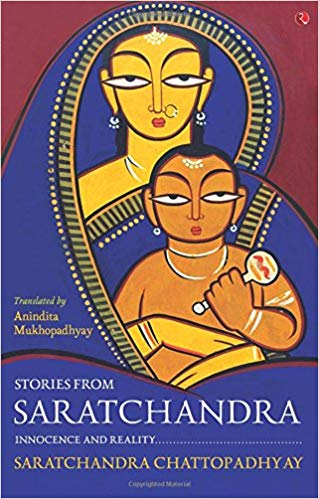Book: Stories from Saratchandra: Innocence and Reality, by Saratchandra Chattopadhyay, translated by Anindita Mukhopadhyay
Publisher: Rupa
Price: Rs 295
Rajkumari Sharma Tankha
I love reading classics. I have read most works of Rabindranath Tagore, Saratchandra Chattopadhyay, Munshi Premchand, Amrita Pritam, Mahadevi Verma in Hindi. Of these three, Saratchandra is my favourite. I simply love his stories; I’m a huge fan of his story-telling capacity. More so, because I am a sucker for love stories and the subtle romance that Saratchandra writes about in his works touches the core of my heart.
I was around 14 years when I started reading these classics, thanks to our neighbours in Munirka, Delhi. I still remember the family, our next door neighbours, with whom we developed a close friendship later. This family consisted of five members: Vijay uncle, his wife, daughter and his parents. Both dadaji and dadiji (that’s what I called them) were retired professors, and in their home a huge, wall-length almirah proudly showcased a collection of books. Till that time, I used to read comics and children magazines like Nandan, Chandamama, Champak or one in the Enid Blyton’s series, whichever was available at the lending library in our market, Omi Book Shop. I remember Omi Uncle used to charge 50 paise a day for lending a book, any book. And every day, I would be standing before my mom for that 50 paise.
So, when I saw so many books at Vijay uncle’s home, I was thrilled, and felt greedy too. Every day, well, almost every day, I used to enter their drawing room and look at those books, not having enough courage to ask dadiji if I could have them for a reading. Aunty had told me it was dadiji’s collection. Perhaps dadiji understood my longing for books for one day she came to our home with Saratchandra’s Badi Didi in her hand. “Beta you love reading na… take this, you will enjoy it,” she told me with a smile. Was I grateful to her? I was beyond that. I was thrilled and I don’t know how many times I thanked her.
That’s was the beginning. One by one, dadiji shared all her books with me. And I got to know that more than me it was she who was happy sharing those books as no one in her family read them. Their granddaughter, Bitti, though a year younger to me, was quite a serious girl. She neither read story books nor played; she spent most of the time with her school books. I wonder where she is today…
Back to the books…The works of these Bengali authors translated in Hindi are superb but whether the essence of the story and its nuances could be kept in English translation, I was not very sure. So when I got Stories from Saratchandra: Innocence and Reality by Saratchandra Chattopadhyay, translated by Anindita Mukhopadhyay, I was quite sceptical. But I must say, I was pleasantly surprised. Anindita has done quite a good job of it. She is flawless with her language and is able to keep the soul of the original writer in each of the stories.
The book consists of 12 stories divided into two sections. The first section portrays innocent childhood while the second one talks about social issues like casteism and the bonds of almost filial affection between human and animal kingdom.
Saratchandra was a keen observer of happenings in and around society, each of which has been remarkably portrayed in this translation.
The story Laalu-One is hilarious, though what the boy Laalu does to his mother and tutor when she threatens to hire a private tutor if he didn’t stop his pranks is downright mean.
The other stories are darker (like Childhood Memories and Haricharan) — the plots in these revolve around caste, poverty, humiliation and religious persecution which sort of depresses the reader.
But all in all, these are a doyen’s works supplemented with good translation. And for those who don’t know either Bengali or Hindi, a treat.
